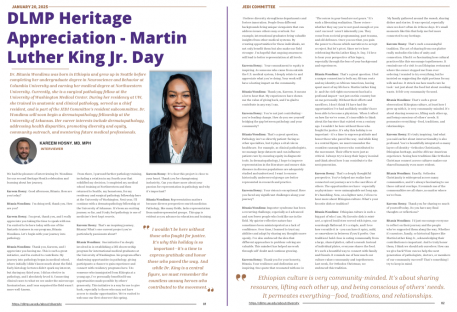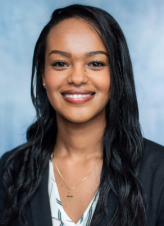DLMP Heritage Appreciation - Martin Luther King Jr. Day
January 20, 2025

Interview by Kareem Hosny, MD, MPH
We had the pleasure of interviewing Dr. Wondimu for our second Heritage Month celebration and learning about her journey.
Dr. Bitania Wondimu was born in Ethiopia and grew up in Seattle before completing her undergraduate degree in Neuroscience and Behavior at Columbia University and earning her medical degree at Northwestern University. Currently, she is a surgical pathology fellow at the University of Washington Medical Center. During her residency at UW, she trained in anatomic and clinical pathology, served as a chief resident, and is part of the JEDI Committee's resident subcommittee. Dr. Wondimu will soon begin a dermatopathology fellowship at the University of Arkansas. Her career interests include dermatopathology, addressing health disparities, promoting diversity and equity, community outreach, and mentoring future medical professionals.

Kareem Hosny: Good afternoon, Bitania. How are you today?
Bitania Wondimu: I’m doing well, thank you. How are you?
Kareem Hosny: I’m great, thank you, and I really appreciate you taking the time to speak with me. I’m excited to be here today with one of the fantastic trainees in our program, Bitania Wondimu. Let’s begin with your journey into pathology.
Bitania Wondimu: Thank you, Kareem, and I appreciate you having me. This is such a great initiative, and I’m excited to contribute. My journey into pathology began in medical school, where initially I didn’t know much about the field. Early histology lectures didn’t spark my interest, but during my third year, I did an elective in pathology, and I absolutely loved it. Connecting clinical cases to what we see under the microscope fascinated me, and I was surprised the field wasn’t more well-known. From there, I pursued further pathology training, including a rotation in my fourth year that solidified my decision. I completed my medical school training at Northwestern and then returned to Seattle, my hometown, for my residency and surgical pathology fellowship here at the University of Washington. Next year, I’ll continue with a dermatopathology fellowship at the University of Arkansas. It’s been an exciting journey so far, and I truly feel pathology is one of medicine’s best-kept secrets.
Kareem Hosny: That’s an inspiring journey, Bitania! What’s one current project you’re particularly passionate about?
Bitania Wondimu: One initiative I’m deeply involved in is establishing a DEI observership program for international medical graduates at the University of Washington. his program offers shadowing opportunities in pathology, giving participants a chance to gain experience and connect with residency programs here. TAs someone who immigrated from Ethiopia at a young age, I’ve personally benefited from opportunities made possible by others’ generosity. This initiative is a way for me to give back, especially to those who may not have access to similar opportunities. We’re excited to welcome our first observer this spring.
Kareem Hosny: It’s clear this project is close to your heart. Thank you for championing inclusivity. Can you share more about your passion for representation in pathology and why it’s important?
Bitania Wondimu: Representation matters because diverse perspectives enrich medicine. Pathology, like many fields, lacks representation from underrepresented groups. This gap is evident as you advance in education and training. I believe diversity strengthens departments and fosters innovation. People from different backgrounds bring unique viewpoints that can address issues others may overlook. For example, international graduates bring valuable insights from other medical systems. By creating opportunities for these individuals, we not only benefit them but also make our field stronger. I’m hopeful that ongoing awareness will lead to better representation at all levels.

Kareem Hosny: Your commitment to equity is inspiring. As someone who came from outside the U.S. medical system, I deeply relate to and appreciate what you’re doing. Your work will have a lasting impact on the community.
Bitania Wondimu: Thank you, Kareem. It means a lot to hear that. My experiences have shown me the value of giving back, and I’m glad to contribute in any way I can.
Kareem Hosny: You’re not just contributing—you’re leading change. How do you see yourself bridging the gap between pathology and your community?
Bitania Wondimu: That’s a great question. Pathology isn’t as directly patient-facing as other specialties, but it plays a vital role in healthcare. For example, as clinical pathologists, we manage large datasets and can influence patient care by ensuring equity in diagnostic tools. In dermatopathology, I hope to improve representation in the literature and ensure skin diseases in diverse populations are adequately studied and understood. I want to ensure historically underserved groups are better represented in research and practice.
Kareem Hosny: Your vision is exceptional. Have you faced any significant challenges along your journey?
Bitania Wondimu: Imposter syndrome has been a recurring challenge, especially as I advanced and saw fewer people who look like me in the field. My quieter reflective nature has sometimes been misinterpreted as a lack of confidence. Over time, I learned to trust my abilities and adapt by sharing my thoughts more openly. I’ve also embraced the idea that different approaches to problem-solving are valuable. This mindset has helped me work through self-doubt and continue growing.
Kareem Hosny: Thank you for your honesty, Bitania. Your resilience and dedication are inspiring. One quote that resonated with me is: “The voices in your head are not yours.” It’s such a liberating realization. Those voices—whether they say you’re not good enough or you can’t succeed—aren’t inherently you. They come from societal programming, past trauma, and old defenses. Once you see that, you gain the power to choose which narratives to accept or reject. But let’s pivot. Since we’re here celebrating Martin Luther King Jr. Day, I’d love to hear your perspective of his legacy, especially through the lens of your background and experiences.
Bitania Wondimu: That’s a great question. I feel a unique connection to both my African roots and my identity as African-American, having spent most of my life here. Martin Luther King Jr. and the civil rights movement has had a profound impact—not just on this country but on me personally. Without their efforts and sacrifices, I don’t think I’d have had the opportunities I’ve had and likely wouldn’t have been able to become a physician. When I reflect on how far we’ve come, it’s incredible to think about the barriers that existed even a century ago. I wouldn’t be here without those who fought for justice. It’s why this holiday is so important—it’s a time to express gratitude and honor those who paved the way. And while King is a central figure, we must remember the countless unsung heroes who contributed to the movement. Their efforts were just as critical. I always try to keep their legacy in mind and think about how I can contribute to the next generation.
Kareem Hosny: That’s a deeply thoughtful perspective. You’ve helped me realize how connected our journeys are to the sacrifices of others. The opportunities we have—especially as physicians—were unimaginable not long ago. It’s humbling. Now, on a lighter note, I’d love to hear more about Ethiopian culture. What’s your favorite dish or tradition?
Bitania Wondimu: Ethiopian culture is such a big part of who I am. My favorite dish is misir wot, a spiced lentil stew served with injera, our sourdough flatbread. It’s a staple, and I love how versatile it is—you can have it spicy, mild, or somewhere in between if you’d prefer. One tradition I hold close is eating communally from a large, shared platter, called a mesob. Instead of individual plates, everyone shares the food. It’s such a beautiful way to connect with family and friends. It reminds me of how much our culture values community and togetherness. Last week, for Orthodox Christmas, we embraced this tradition. My family gathered around the mesob, sharing dishes and stories. It was special, especially since we don’t often do it these days. It’s small moments like this that help me feel more connected to my heritage.
Kareem Hosny: That’s such a meaningful tradition. The act of sharing from one platter really embodies the idea of unity and connection. I find it so fascinating how cultural practices like this encourage togetherness. It reminds me of a visit to an Ethiopian restaurant where the owner stopped me from over-ordering. I wanted to try everything, but he insisted on suggesting the right portions for my wife and me. It struck me how much care he took—not just about the food but about avoiding waste. It felt very community-focused.
Bitania Wondimu: That’s such a great observation! Ethiopian culture, at least how I grew up with it, is very community-minded. It’s about sharing resources, lifting each other up, and being conscious of others’ needs. It permeates everything—food, traditions, and relationships.
Kareem Hosny: It’s truly inspiring. And what you said earlier about intersectionality is also profound. You’ve beautifully integrated so many layers of identity—Orthodox Christianity, Ethiopian heritage, and the African-American experience. Seeing how traditions like Orthodox Christmas connect across cultures makes our shared humanity even more evident.
Bitania Wondimu: Exactly. Orthodox Christianity is widespread across many communities, and it’s always fascinating to see those cultural overlaps. It reminds me of the commonalities we all share, no matter where we’re from.
Kareem Hosny: Thank you for sharing so much of yourself today. Do you have any final thoughts or reflections?
Bitania Wondimu: I’d just encourage everyone to reflect on their journey and the people who’ve supported them along the way. Whether it’s mentors, family, or historical figures like Martin Luther King Jr., acknowledging their contributions is important. And to truly honor them, I think we should ask ourselves: How can we give back? How can we help the next generation of pathologists, doctors, or members of our community succeed? That’s something I try to keep in mind.
